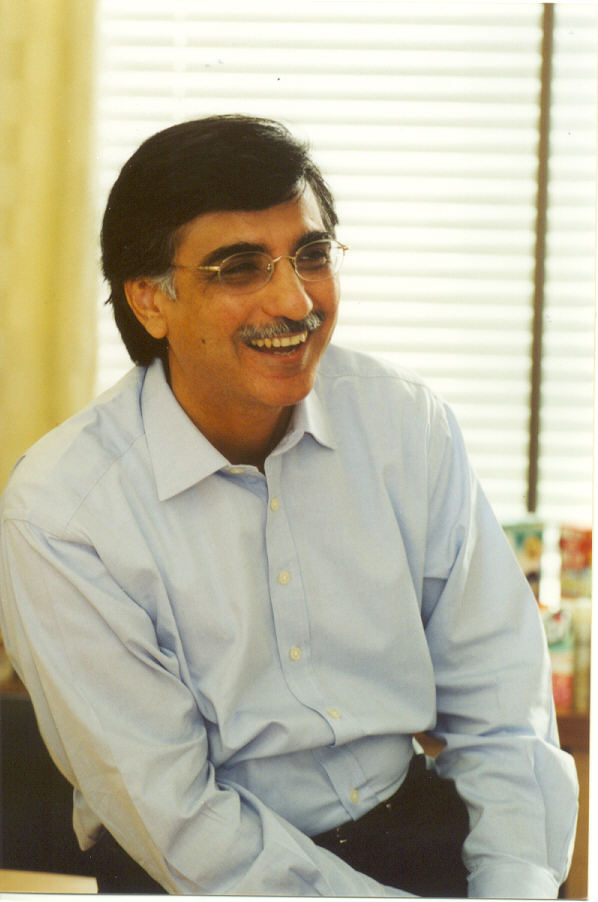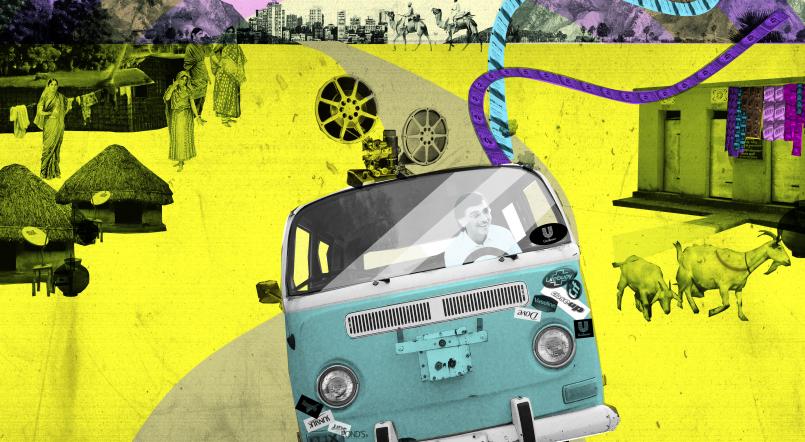In many ways, Harish Manwani is the archetypal ‘one-company’ man. After graduating with a master’s degree in 1976, he joined Unilever in India as a management trainee. Having been with the company for over three decades, today, he serves as COO of the Anglo-Dutch multinational corporation.

One could argue, however, that he did not join a multinational corporation at all. Manwani points out that the Indian subsidiary of Unilever – Hindustan Unilever – is perceived by many in India to be a bona fide Indian company. Unilever’s emphasis on localisation is well documented; it was the first foreign company in India to appoint an Indian chairman, and the first Western company to invest in a major research lab in the sub-continent. Above all, Manwani believes the company’s mantra of “What is good for India is good for Unilever” helps underscore the MNC’s deep local roots.
Cinema-vans and laundry demonstrations
Growing up in the city of Mumbai, Manwani’s early experiences with the company were transformative. As a management trainee, the first part of the training brought him to the villages of rural India to market Unilever’s products. His eyes sparkle as he recounts his time serving these far-flung hinterland markets.
“It was a hard life, but there was a thrill of doing real business. And, as someone from the city, it was a challenge I wanted to take on,” he says. “What were we doing at the time goes to the heart of market development; that is to serve the un-served.”

He travelled across rural Indian villages in a ‘cinema-van’, from which he could do sales and product demonstrations in market bazaars during the day. By night, the van could be converted into an open-air cinema to provide rare celluloid entertainment for people otherwise out of reach of mass media. The shows would be interspersed with advertising messages focusing on the importance of washing hands properly, or the value of using detergents (rather than a bar of soap) to wash clothes.
It was not easy travelling on long dusty roads for days on end, but it taught him the value of making connections with real consumers.
These interactions taught him the importance of putting the consumer at the heart of the business. It gave him invaluable insights into the needs of rural consumers – insights that sometimes contradicted best practices taught in business school. For example, the conventional way to price a product is to first identify the cost of production, and then to introduce a profit margin on top of that cost.
However, Manwani learnt that this approach would not work when selling shampoos to low-income consumers. Instead, the key was to engage with consumers to better understand what they were able and willing to pay. From that price point, you would need to reverse engineer by deducting a profit margin, and then setting the target cost for the business.
Unilever managed to dramatically reduce production costs by using new technologies and leveraging a wider network of supply partners. The company also reformulated its shampoo. Rural Indian women typically oil their hair before shampooing, and so Unilever re-engineered the shampoo – to reduce its conditioning properties, while increasing its cleansing properties. This both saved costs and better met consumer needs. As a result, shampoo sales in rural India took off.
Corporate comforts
Manwani’s first international assignment to the UK helped him appreciate the company’s global reach. Despite his optimistic nature, he admits that adapting to a new culture and climate was not easy.
The culture shock was eased by Unilever’s consistent, familiar corporate culture. He recalls that stepping into the Bristol office of Unilever was not that different from working in Mumbai; he heard the same ‘Unilever speak’ in the corridors, and saw the same corporate values and commitment to local communities.
His international experience made him understand that in spite of differences across cultures, there were also strong commonalities. “All cultures respond to authenticity and appreciate managers who take time to build one-on-one relationships,” he says. “In all cultures, having a compelling vision helps engage people.”
Coming from an emerging economy, he appreciated the growth-focussed mindset and entrepreneurial drive he saw in Asia. At the same time, he had a lot of respect for the rigour and finely honed processes that he noticed in the developed markets.
Manwani realised that Unilever’s ability to provide a diversity of experiences helps set the company apart. “Our leaders need to be just as comfortable in the rural villages of India as they are in the corridors of our headquarters in London,” says Manwani. Another important lesson was the need to balance a sharp focus on local consumers with the organisational ability to leverage global scale. “We must not be mindlessly global nor hopelessly local,” he says, “Instead, we seek to be locally relevant and globally leveraged.”
Doing well by doing good: the Shakti Programme
In 2000, Unilever realised that there was an opportunity across thousands of rural villages in India that were difficult to reach and lacked a retail distribution network and media access.
NGOs at the time were organising women in these villages into self-help groups to provide support for each other, while banks were willing to provide micro-credit facilities to help finance small projects. But there was a missing link in this model. There were no income-generating opportunities.
That was when Unilever designed and introduced the Shakti Programme. ‘Shakti’ means strength in Hindi, and the programme helps impoverished women set up small businesses as Unilever’s direct-to-consumer retailers. Unilever employees taught rural women not just basic business skills, but also trained them as ambassadors of hygiene and nutrition for their villages. These skills helped families and communities, but also built Unilever brands, like Lifebuoy and Wheel, and created a crucial new distribution channel for Unilever products.
What we were doing at the time goes to the heart of market development; that is to serve the un-served.
By leveraging the self-help groups and building on the micro-lending facilities, the Shakti Programme helped impoverished rural women become entrepreneurs. This improved their livelihoods and helped the company boost its distribution reach. This is consistent with Unilever’s corporate belief in “Doing well by doing good”.
“We sell everyday products, like soap and soup, but our brands can be powerful agents of social change,” says Manwani.
He recalls an encounter during a visit to one of the villages to evaluate the impact of the Shakti Programme. “I was immediately struck by how empowering it was to be a Shakti lady and how much dignity it gave her within the community.”
This was evident in how other villagers would approach and greet her with respect when they walked through the village together. When Manwani noticed that the Shakti lady had a three-year-old daughter, he asked the mother, “What would you like your daughter to be when she grows up?”
The reply was unequivocal: “A Shakti lady.”
Leading by vision
Manwani has had a stellar career. He has held senior leadership positions around the world, but he has faced his share of challenging times as well. In his first significant leadership role, Manwani was appointed the youngest-ever lead for one of India’s biggest regions. He was expected to deliver business results in his first year, which was also a milestone year for the company. However, he soon realised that there were inherent structural problems that needed long-term investment to be fixed.
It was a tough dilemma. Should he direct efforts to meet the short-term business targets, or focus on restructuring the unit for longer-term success? In the end, he set out his vision for future growth, but also took the difficult decision to first focus on fixing the fundamentals of the organisation.
His team members were clearly upset to miss their annual targets. “I feel a strong sense of accountability to the people I lead,” says Manwani, “and it was tough to see their disappointment. But ultimately, it was the right thing to do.”
Manwani is a strong believer in leading by vision. “A vision is not about setting targets, but about changing behaviours and motivating people to go the extra mile,” says Manwani. “A good leader must have the ability to define a compelling destination combined with a sharp operational focus on the ‘here and now’. That is key to delivering long-term success.” Yet, Manwani admits that he had done little long-term career planning, choosing instead to focus his full efforts on whatever tasks he was assigned at the time.
Leadership lessons
Manwani attributes the career success he has achieved to a few key leadership lessons he learned along the way. First are what he calls the non-negotiables: value-led and purpose-driven leadership. He whole-heartedly embraces Unilever’s philosophy of “Doing well by doing good” and its model of responsible growth.
This philosophy helps the company define an implicit role for business in society, while becoming a driver for long-term sustainable growth. In addition, the plan emphasises the importance of putting the consumer at the heart of the business. For a global company like Unilever, this means its leaders need to think local and act global, and focus on leveraging the company’s global scale and knowledge to meet the needs of local consumers everywhere. Unilever also see a responsibility to develop, coach and mentor future leaders. As Manwani says, “My role as a leader is to build the next generation of leaders, who will be bigger and better than me.”
As a role model to many aspiring business leaders, his advice to others is short and simplistic, but no less sincere: “Be yourself. People simply want to see the real you.”
This article was first published in HQ Asia (Print) Issue 06 (2013)


